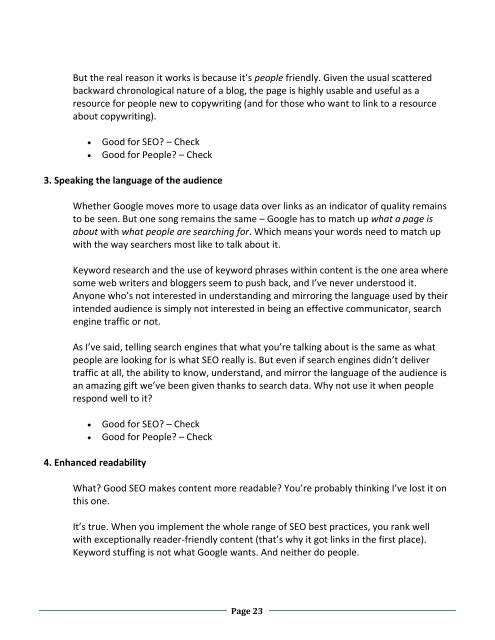How to Create Compelling Content
How to Create Compelling Content That Ranks Well in Search Engines This free 27-page report by Copyblogger founder Brian Clark provides you a step-by-step strategy for creating content that scores links, is highly readable and engaging, and ranks well in
How to Create Compelling Content That Ranks Well in Search Engines This free 27-page report by Copyblogger founder Brian Clark provides you a step-by-step strategy for creating content that scores links, is highly readable and engaging, and ranks well in
Create successful ePaper yourself
Turn your PDF publications into a flip-book with our unique Google optimized e-Paper software.
But the real reason it works is because it’s people friendly. Given the usual scattered<br />
backward chronological nature of a blog, the page is highly usable and useful as a<br />
resource for people new <strong>to</strong> copywriting (and for those who want <strong>to</strong> link <strong>to</strong> a resource<br />
about copywriting).<br />
Good for SEO? – Check<br />
Good for People? – Check<br />
3. Speaking the language of the audience<br />
Whether Google moves more <strong>to</strong> usage data over links as an indica<strong>to</strong>r of quality remains<br />
<strong>to</strong> be seen. But one song remains the same – Google has <strong>to</strong> match up what a page is<br />
about with what people are searching for. Which means your words need <strong>to</strong> match up<br />
with the way searchers most like <strong>to</strong> talk about it.<br />
Keyword research and the use of keyword phrases within content is the one area where<br />
some web writers and bloggers seem <strong>to</strong> push back, and I’ve never unders<strong>to</strong>od it.<br />
Anyone who’s not interested in understanding and mirroring the language used by their<br />
intended audience is simply not interested in being an effective communica<strong>to</strong>r, search<br />
engine traffic or not.<br />
As I’ve said, telling search engines that what you’re talking about is the same as what<br />
people are looking for is what SEO really is. But even if search engines didn’t deliver<br />
traffic at all, the ability <strong>to</strong> know, understand, and mirror the language of the audience is<br />
an amazing gift we’ve been given thanks <strong>to</strong> search data. Why not use it when people<br />
respond well <strong>to</strong> it?<br />
Good for SEO? – Check<br />
Good for People? – Check<br />
4. Enhanced readability<br />
What? Good SEO makes content more readable? You’re probably thinking I’ve lost it on<br />
this one.<br />
It’s true. When you implement the whole range of SEO best practices, you rank well<br />
with exceptionally reader-friendly content (that’s why it got links in the first place).<br />
Keyword stuffing is not what Google wants. And neither do people.<br />
Page 23

















